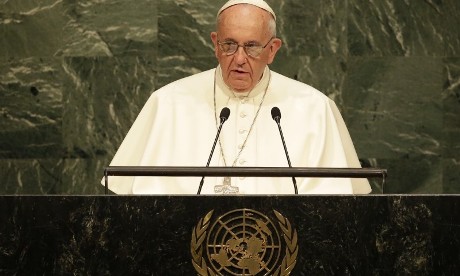Pope Francis spent much of his address to the United Nations in New York connecting environmental destruction with social and economic exclusion.
“A selfish and boundless thirst for power and material prosperity leads both to the misuse of available natural resources and to the exclusion of the weak and disadvantaged,” he said on Friday.
Francis delivered the fifth papal address to the United Nations and the first to open its General Assembly session.
In a speech without direct mention of climate change, Francis pressed for “reclaiming the environment”.
The Pope called the passage of the 2030 Agenda for Sustainable Development, formally adopted after his speech, “an important sign of hope”.
The 17 goals and 169 targets seek to end poverty, promote education and gender equality, secure access to water and sustainable energy, and to address climate change.
The best and simplest measures to implementing the goals, Francis said, will be “effective, practical and immediate access” for all to housing, dignified work, adequate food and drinking water, education, and religious and spiritual freedom.
“These pillars of integral human development have a common foundation, which is the right to life and, more generally, what we could call the right to existence of human nature itself,” the Pope said.
Pope Francis also urged for an end to nuclear weapons, war and a culture of exclusion, and for a recognition of the moral law in human nature, one that differentiates between man and woman and has “absolute respect for life in all its stages and dimensions”.
Francis also said that nature had rights.
“It must be stated that a true ‘right of the environment’ does exist,” Francis said.
It exists for two reasons, first because human beings are part of the environment, and second, every creature has intrinsic value in its existence, beauty and interdependence.
An attack on the environment was an assault on the rights and living conditions of the most vulnerable, he said.
He called for governments to do everything possible to provide conditions that allow for people to create and support families, which are “the primary cell of any social development”.
Sources
